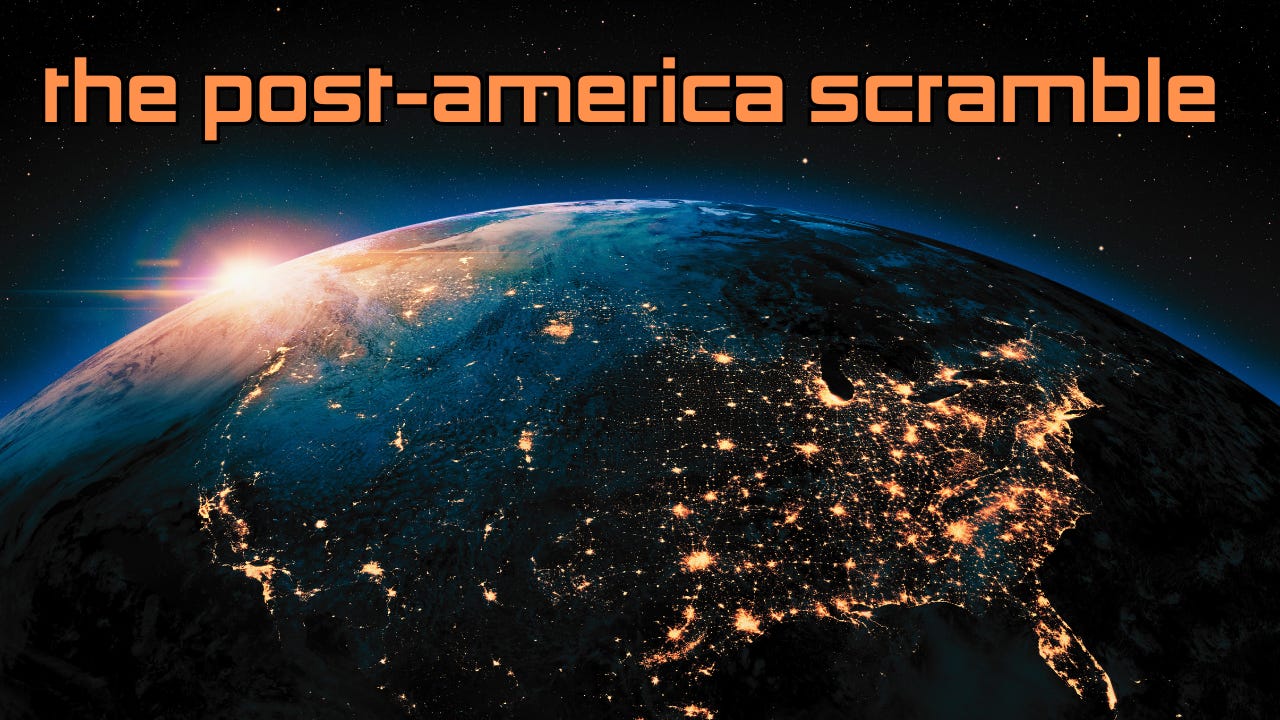The unipolar moment did not die in a spectacular collapse. There was no single battle, no treaty, no sudden toppling of flags. It is vanishing the way a sunset does—quietly, subtly, and by degrees—until the light is gone and only the silhouettes of old institutions remain. What once seemed permanent now reveals itself as transitional. Atlanticism, the ideological and institutional scaffolding of U.S.-led hegemony, is slowly disintegrating beneath the weight of its contradictions, both global and domestic.
After the Cold War, American power expanded into a vacuum. The Soviet collapse was interpreted not merely as a geopolitical victory but as a metaphysical confirmation of liberal democracy’s destiny. From that triumph emerged the “rules-based international order,” a euphemism for U.S. prerogatives institutionalized through a web of global governance systems—the World Bank, the IMF, the United Nations Security Council, SWIFT, and dozens of Western-led NGOs and think tanks. These were not neutral instruments of peace and prosperity, but levers of influence cloaked in the language of universal values.
Washington wielded them masterfully, using financial conditionality, development loans, sanctions, and military aid to coerce compliance and manufacture dependence. Countries that resisted the order were isolated, regime-changed, or punished economically. Those that complied were often hollowed out, stripped of strategic industries, and assimilated into a global supply chain designed for the benefit of the transatlantic core. The ideological veneer was always “freedom,” “democracy,” and “human rights.” But the reality was power.
The hypocrisy became untenable. As the U.S. declared itself the arbiter of global morality, it launched wars of aggression under pretexts of liberation—Yugoslavia, Iraq, Afghanistan, Libya, Syria. These invasions did not bring freedom. They brought devastation, fragmentation, and the slow, seeping death of American moral authority. Meanwhile, the global south, Russia, and China watched and took note. What the Atlantic Bloc sold as liberalism increasingly looked like coercion. What was branded as humanitarianism began to appear as imperialism repackaged.
Culturally, too, the West drifted into alien terrain. The very civilizational values that had once given coherence to the Atlantic world—Judeo-Christian ethics, classical liberalism, rule of law, patriotism, free enterprise, and national identity—were not projected outward as a unifying ideal, but were instead undermined from within. The elite class of the globalist order did not seek to uplift their domestic populations as partners in power. Rather, they attempted to reengineer them, replacing rooted cultural frameworks with an abstract, post-national ethos grounded in identity politics, equity-based power hierarchies, and civilizational self-negation.
Across the United States and Western Europe, traditional populations found themselves increasingly alienated, policed for their speech, shamed for their histories, and expected to subordinate their interests to a global project they never consented to. Their identities—as national citizens, as Christians, as economic producers, as men and women—became suspect under a new elite ideology that viewed the native majority itself as an obstacle to global integration. Rather than being mobilized in defense of their civilization, they were pathologized, disempowered, and replaced.
The globalist project—at least in its Atlantic incarnation—was not content to govern populations. It sought to reshape human nature. But this ideological export was alien to the civilizational DNA of much of the planet. In Eastern Europe, Russia, China, Africa, and the Islamic world, liberalism’s new form—rooted in hedonism, cultural nihilism, and institutional self-loathing—was not seen as a beacon of progress, but as a pathology. The attempt to impose this framework globally only accelerated Western alienation from the rest of the world.
And so the multipolar response began. Russia, rejected by the West and no longer burdened by communist ideology, returned to geopolitical realism. China emerged not only as an economic rival, but as a civilizational state—a model that fused capitalism with sovereignty, Confucian ethics with technocracy, and diplomacy with strategic patience. The Global South, long on the receiving end of Western paternalism, began organizing around new institutions—BRICS, the SCO, Belt and Road. They did not seek confrontation, but emancipation.
Zbigniew Brzezinski, before his death, warned of what he called the “Post-America Scramble.” It was not an apocalypse, but a reckoning—a moment when American power would no longer be unchallenged, and where new centers of gravity would emerge, not out of ideology, but out of necessity. That moment has arrived. The West’s grip on the levers of global governance has loosened. The ideological consensus that sustained the unipolar world has shattered. And the international order, once shaped by Atlantic vision, now moves without its command.
Even within the United States, the strategic tone has changed. The globalist project has lost public legitimacy. What rises in its place is not a revival of classical liberalism, but a hardened form of Realist nationalism. Populist sentiment, once dismissed as reactionary, is now being harnessed by the state to justify military buildup, economic protectionism, and renewed hemispheric assertiveness. China is the external threat, but the internal narrative has shifted as well. American elites have begun to realize that survival now requires rallying, not dissolving, the core.
This is not a return to idealism. It is a strategic pivot—ideology as instrument, not identity. What was once global liberalism becomes American realism. The tools of identity politics may be cast aside if they no longer serve regime preservation. The symbols of nationhood, long suppressed, may be resurrected—not because elites believe in them, but because they are useful. In a time of fragmentation, even the architects of empire must rediscover the uses of flags.
The Atlantic Bloc’s long campaign for global integration—dreamed in the halls of Versailles, institutionalized after Bretton Woods, and evangelized after 1989—has run its course. The unipolar illusion is ending. What emerges in its wake is a world not of consensus, but of contradiction, not of shared governance, but of competitive autonomy. The quiet death of Atlanticism is not a defeat. It is a return to realism.
And in realism, there are no endings—only realignments.





